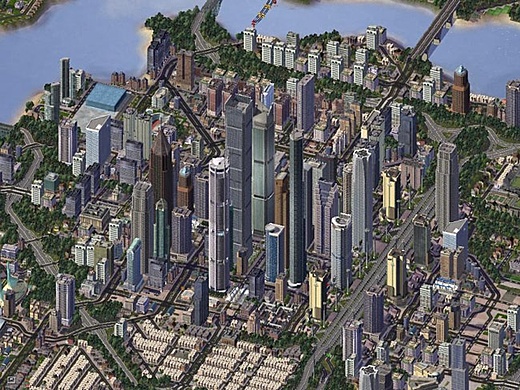By John-Paul Flintoff on 16 April 2009 in Times Online -
(http://timesonline.typepad.com/environment/2009/04/how-civilisation-will-collapse-and-when.html)
 Image above: A screenshot of "Sim City" by Electronic Arts. The original game was created in 1984 for the Amiga computer.
OK, well that's rather a grand headline, designed to command your attention. I don't actually know how our civilisation will collapse, or when, obviously, but have been picking up some clues in the new book by David Holmgren, co-designer of permaculture.
Image above: A screenshot of "Sim City" by Electronic Arts. The original game was created in 1984 for the Amiga computer.
OK, well that's rather a grand headline, designed to command your attention. I don't actually know how our civilisation will collapse, or when, obviously, but have been picking up some clues in the new book by David Holmgren, co-designer of permaculture.
 Image above: A screenshot of "Sim City" by Electronic Arts. The original game was created in 1984 for the Amiga computer.
OK, well that's rather a grand headline, designed to command your attention. I don't actually know how our civilisation will collapse, or when, obviously, but have been picking up some clues in the new book by David Holmgren, co-designer of permaculture.
Image above: A screenshot of "Sim City" by Electronic Arts. The original game was created in 1984 for the Amiga computer.
OK, well that's rather a grand headline, designed to command your attention. I don't actually know how our civilisation will collapse, or when, obviously, but have been picking up some clues in the new book by David Holmgren, co-designer of permaculture.
In Future Scenarios, Holmgren leaves little doubt that the twin threats of climate change and peak oil (in fact, peak energy, because other fossil fuels will run out too) will have a revolutionary effect on the way we live.
And the changes are coming sooner than expected - Holmgren points to a comprehensive study showing that the amounts of energy needed to extract and refine energy are increasing so fast that by as soon as 2014 the net energy yield from gas in Canada (to name just one major producer) will fall to almost nothing.
"The implications are so shocking that the naive and simplistic idea that we are running out of oil and gas (rather than just peaking in production) may be closer to the truth than even the most pessimistic assessments of peak-oil proponents a decade ago."
Officialdom remains, apparently, oblivious. Holmgren points out that the US Department of Agriculture considers an energy return on energy invested (EROEI) of 1.6 for corn ethanol a "good result". But a society based on an energy source of this quality would be constantly investing 62 per cent of its energy back into the energy industry, leaving just 38 per cent for everything else - health, education, culture, food production, leisure and so on. We've been used to fuels with EROEI rates as high as 100.
If this sounds alarming - well, it is. But Holmgren is a profoundly hopeful man, and his book makes the case that, while change is inevitable, our civilization may not collapse altogether like the Mayan but only gradually decline, like the Romans. "The conditions for ordinary people may actually improve when the resources devoted to maintaining societal complexity are freed for meeting more basic needs," he says.
"I don't want to underplay the possibility of a total and relatively fast global collapse of complex societies. I think this is a substantial risk, but the total-collapse scenario tends to lead to fatalistic acceptance, or, alternatively, notions of individual or family survivalist preparations."
It's so shocking, it can make people reject even thinking about the future, thus increasing the likelihood of very severe energy descent, if not total collapse.
In the book Holmgren sets out four overlapping descent paths (covering everything from neo-fascist state and corporate control to knit-your-own-yurt) that could play out over a similar time-frame to the industrial ascent era - roughly 250 years. It's up to us to determine which descent path prevails by planning ahead.
"We do not have to believe that a particular scenario is likely before making serious preparations. For example, most people have fire insurance on their homes, not because they expect their primary asset to be destroyed by fire but because they recognize the severity of this unlikely event."
As somebody already convinced that permaculture offers a useful philosophical and practical framework for dealing with our problems - in short, weaning ourselves from systems we can't control and trying to achieve something like sustainable self-sufficiency - I was already inclined to find Holmgren persuasive. But the book proved even better than expected. For several days now, this insight has rattled round my skull:
"'Civilisation triage' refers to conserving technology and culture that could be useful to a future society. The Christian monasteries that saved many elements of the Greco-Roman culture and later provided the foundations for the Renaissance could serve as a model... Like the monks of Lindisfarne, we have to choose what is worthwhile at this great turning point in history - the mixed pieces of myriad broken traditional cultures and the novel and shining bits of unraveling industrial modernity. All of this will end in the dustbin of history. Our task is to choose which pieces will be useful. What is worth saving?"
1 comment :
From my perspective...pretty much
NONE OF IT
Post a Comment